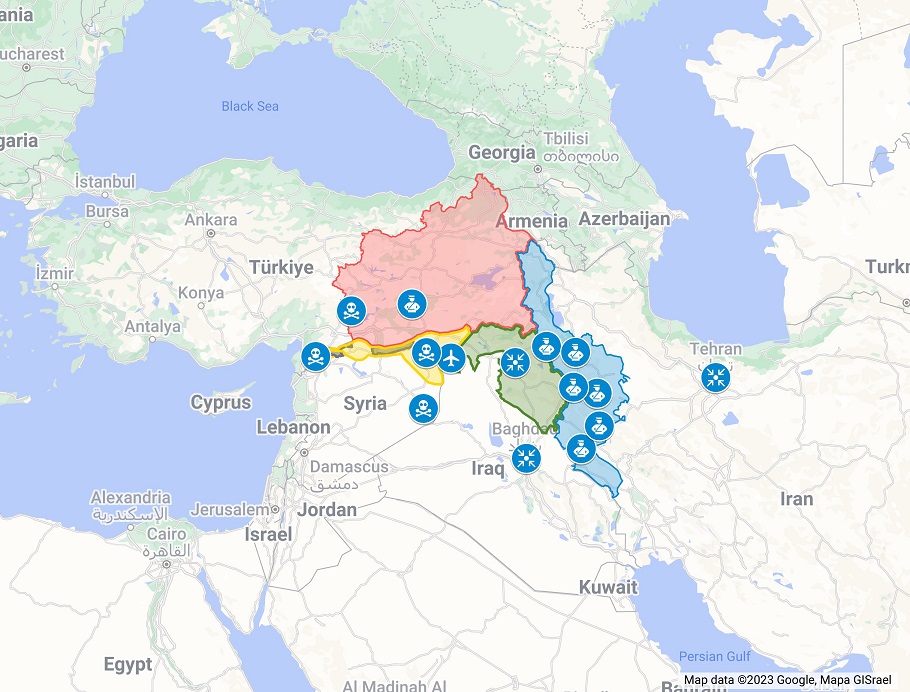1.8K
A weekly brief of events occurred in the Kurdistan regions of Iran, Iraq, Syria, and Turkey.
Iran
- The Iranian regime targeted more community leaders in the nation’s Kurdish region, most notably imams and teachers, as part of its ongoing campaign to eradicate civil dissent and reassert its authority. The Hengaw Organization for Human Rights reported that Iranian authorities have arrested 22 Kurdish language teachers in 2023, including Omid Moshirpanahi in Sena on Friday. The regime also arrested two more Kurdish imams for supporting anti-regime protests in Piranshahr. Concurrently, Iranian security forces detained Saed Najmi and Saadi Ashkawand in Marivan and three Kurdish men in Bokan. Moreover, several detainees in Ilam launched a hunger strike to protest being detained without charge. In addition, the regime executed a Kurdish political prisoner named Sarkawat Ahmed for “membership of a Kurdish party” and “assassinating an Iranian security officer” on Wednesday in Kermanshah. The regime also sentenced a Kurdish singer named Khabat Fiadi to six years in prison for “propaganda.” Separately, the European Union (EU) sanctioned more Iranian officials and entities for human rights violations and supporting Russia’s invasion of Ukraine. That said, the EU again failed to list the Islamic Revolutionary Guard Corps (IRGC) as a terrorist entity. Meanwhile, Minister of State for Security of the United Kingdom (U.K.) Tom Tugendhat briefed the British Parliament on the Iranian regime’s threats against U.K.-based dissidents and journalists, several of which forced the television network Iran International to close its London offices. On February 27, IRGC commander Hossein Salami threatened to attack Europe for sanctioning Iran and hosting Iranian dissidents. Lastly, the Canadian government sanctioned 12 senior Iranian officials for violating the human rights of peaceful demonstrators.
Iraq
- The Kurdistan Regional Government (KRG) Council of Ministers announced Baghdad and Erbil reached a preliminary agreement on Iraq’s 2023 budget bill. The Iraqi government previously rejected several KRG proposals regarding the budget and the provision of salaries for public sector employees in Iraqi Kurdistan. The two sides are now likely to continue efforts to resolve several other outstanding issues, including the drafting and implementation of new oil and gas laws.
- The Kurdistan Democratic Party (KDP) and the Patriotic Union of Kurdistan (PUK) reached agreements on four points for Iraqi Kurdistan’s new election laws. Both parties’ election bureaus met on Tuesday, agreeing to divide the region into four electoral districts. The number of seats in the constituencies will be based on the Iraqi Ministry of Commerce statistics. The Kurdistan Parliament spokesperson told Rudaw amending the electoral laws will be a priority during the legislative session that begins on March 1. The Kurdistan Parliament extended its legislative term by one year last fall after Iraq’s Kurdish parties failed to hold parliamentary elections.
- A Turkish drone strike killed two Shingal Resistance Forces (YBS) commanders on Monday. Turkey appears to have resumed targeting Kurds in Iraq and Syria after briefly curtailing operations in response to the Kahramanmaras earthquake.
Syria
- On February 27, An IED exploded near Rafidah school in Al-Hasakah. One woman was injured. This comes a few days after an IED destroyed the car of a government employee of the Kurdish Autonomous Administration of North and East Syria (AANES). Local information suggests “Turkish Intelligence” is involved. Moreover, Turkish Armed Forces and their proxy forces shelled Um Al-Kaif and Al-Kuzaliyah villages in the Tel Tamr countryside northwest of Al-Hasakah. No casualties were reported.
- Members of a Da’esh cell opened fire on Kurdish Internal Security Forces (Asayish) in Abu Hardoub, near Deir Ez Zor. One Asayish member was killed, and others were injured. The attackers were not apprehended. One day later, Da’esh units on motorcycles attacked a column of oil trucks near the entrance, forcing them to stop. Syrian Democratic Forces (SDF) units were put on high alert to support.
- Abu al-Aina’ al-Deri, a commander with the Turkish-backed Syrian National Army (SNA), used a fake name to shelter in Jindires to steal humanitarian aid. Three other groups within the SNA are colluding with Jindires’ local council to add their gunmen to the list of earthquake-affected people to increase the theft operation. Separately, the EU eased sanctions on the Syrian regime, “additional humanitarian amendment,” to ensure the delivery of European aid to Syria.
Turkey
- The Turkish Red Crescent admitted on February 27 to selling tents and food that were supposed to be distributed free of charge to the AHBAP charity association, the Turkish Pharmacists’ Association, and residents. At the same time, the government blocked aid to be distrubted to victims from several local organizations, including in the Kurdish region. The Pro-Kurdish Peoples’ Democratic Party (HDP) bloc submitted a motion in Turkey’s grand assembly, requesting a public hearing to reveal “those who have political and administrative responsibility for the consequences” of the earthquake.
- An Ankara judge followed the guidance of the Turkish gendarmerie’s cybercrime unit, ordering a tweet referencing the killing of Ahmet Güreşçi, one of the brothers arrested, tortured, and beaten in Hatay on February 11. Ahmet died in custody. The Progressive Lawyers Association posted the tweet. Moreover, two journalists were arrested for “publicly disseminating misleading information to the public” and face sentences of 1-3 years. The two brothers are being charged for exposing the corruption in aid distribution and selling tents and emergency supplies by the Turkish Red Crescent. Reporters Without Borders (RSF), a media watchdog organization, noted on February 24 that three other TV broadcasters were fined by the Turkish government and called for an end to journalistic repression and for freedom of speech to be respected. Turkey’s Journalistic Freedom ranking is 41.25/100, making them the 149th out of 180 scored countries in this regard.

